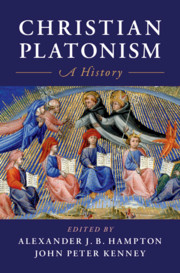Book contents
- Christian Platonism
- Christian Platonism
- Copyright page
- Dedication
- Contents
- Figures
- Contributors
- Acknowledgements
- I Concepts
- 1.1 The Perennial Value of Platonism
- 1.2 The Ideas as Thoughts of God
- 1.3 The One and the Trinity
- 1.4 Creation, Begetting, Desire, and Re-Creation
- 1.5 The Concept of Theology
- 1.6 Participation: Aquinas and His Neoplatonic Sources
- II History
- III Engagements
- Index
- References
1.3 - The One and the Trinity
from I - Concepts
Published online by Cambridge University Press: 20 January 2021
- Christian Platonism
- Christian Platonism
- Copyright page
- Dedication
- Contents
- Figures
- Contributors
- Acknowledgements
- I Concepts
- 1.1 The Perennial Value of Platonism
- 1.2 The Ideas as Thoughts of God
- 1.3 The One and the Trinity
- 1.4 Creation, Begetting, Desire, and Re-Creation
- 1.5 The Concept of Theology
- 1.6 Participation: Aquinas and His Neoplatonic Sources
- II History
- III Engagements
- Index
- References
Summary
This chapter highlights the formative role of Platonism in the making of Christian doctrine. It argues that Platonism’s greatest substantive influences on Christian Trinitarian theology lay in the area of participation metaphysics, as well as in inspiring the more general theological dictum of divine immateriality and intelligibility. Early Christian authors discussed include: Athenagoras, Theophilus, Clement of Alexandria, Marius Victorinus, Augustine, Theodoret, Cyril of Alexandria, Gregory of Nyssa, and Eunomius. The claim that the Christian creator–creature distinction competed with the Platonic intelligible–sensible distinction is examined and rejected.
Information
- Type
- Chapter
- Information
- Christian PlatonismA History, pp. 53 - 78Publisher: Cambridge University PressPrint publication year: 2020
References
Accessibility standard: Unknown
Why this information is here
This section outlines the accessibility features of this content - including support for screen readers, full keyboard navigation and high-contrast display options. This may not be relevant for you.Accessibility Information
- 2
- Cited by
